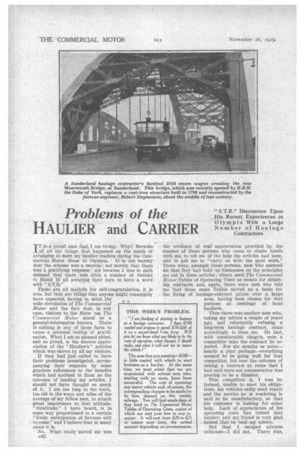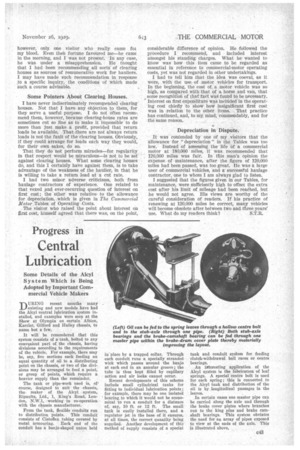Problems of the
Page 80

Page 81

If you've noticed an error in this article please click here to report it so we can fix it.
• HAULIER and CARRIER " S.T.R." Discourses Upon His Recent Experiences at Olympia With a Large Number of Haulage • Contractors IT is a proud man that I am to-clay. Why.? Because of all the things that happened as the result of atranging to meet my haulier readers during the CornInertial .Motor Show at Olympia. It is not merely that the scheme was a success; not merely that there was 'a gratifying response ; nat because I was in such deinand that there was often a number of visitors to Stand 13 all awaiting their turn to have a word
with ". S.T.R.." • .
Those are all matters for self-congratulation, it is true, but•they are •things that anyone might reasonably have expected, having in mind the
wide circulation of The Commercial Motor and the fact that, in_ any• case, visitors to the Show use The Commercial Motor stand as a general-information bureau. There is nothing in any of those facts to cause a personal feeling of gratification. What I am so pleased about, and so proud, is the sincere appreciation of the "Haulier's" articles which was shown by all my visitors.
If they had just called to have their problems investigated, accompanying their requests by some gracious references to the benefits which had accrued to them as the outcome of reading my articles, I should not have thought so much of it. I am too long in the tooth, too old in the ways and wiles of the average of my fellow men, to attach great importance to that attitude. "Gratitude," I have heard, is in some way proportioned to a certain "lively anticipation of favours still to come," and I believe that in many cases it is.
No. What really moved me was c42 the evidence of real appreciation provided by the number of those persons who came to shake hands
• with me, to tell me of the help the articles had been, and to ask me to "carry on with the good work." There were, amongst these persons, men who assured me that they had built up businesses on the principles set out in these articles ; others used The Commercial Motor,Tables of Operating Costs as means for obtain' ing contracts, and, again, there were men who told me that those same Tables served as a basis for . the fixing of haulage-contract prices over a large area, having been chosen for that purpose at meetings of local hauliers.
Then there was another man who, taking my advice a couple of years ago, and reluctantly refusing a long-term haulage contract, came accordingly to bless me. Ile bad, with considerable chagrin, seen a competitor take the contract he rejected. For six months or more— nearly a year perhaps—everything seemed to be going well for that competitor, but now the outcome of taking a contract •at rates that I had said were not remunerative was proving to be a disaster.
This competitor is, I was informed, unable to meet his obligations, his vehicles sadly need repair and the service he is rendering is said to be unsatisfactory, so that his customer is looking for other help. Lack of appreciation of his operating costs has ruined that haulier, and my friend is very glad indeed that he took my advice.
Not that I escaped adverse criticism—I did not. There was,
however, only, one visitor who really came ft)i my blood. Even then fortune favoured me—he came in the morning, and I was not present. In any case, he was under a misapprehension. He thought that I had been recommending all sortsof clearing houses as sources of remuaeratiire work for hauliers. I may have made such recommendation in response to a specific inquiry, the conditions of which made such a course advisable.
Some Pointers About Clearing Houses.
I have never indiscriminately recommended clearing houses. Not that I have any objection to them, for they serve a useful purpose. I do not often recom-, mend them, however, because clearing-house rates are sometimes cut so fine as to make it impossible' to do more than just make a profit, provided that return loads be available. That there are not always return loads is not the fault of the clearing houses. Obviously, if they could arrange for loads each way they, would, for their own sakes, do so.
That they do not perform miracles—for regularity in that respect would be miraculous—is not to be set against clearing houses. What some clearing houses do, and this I certainly have against them, is to take advantage of the weakness of the haulier, in that he Is willing to take a return load at a eat rate.
I had two minor adverse criticisms, both from haulage contractors of experience. One related to that vexed and ever-recurring question of interest on first cost ; the 'other was relative to the allowance for depreciation, .which is given in The Commercial Motor . Tables of Operating Costs.
The visitor, who raised the point about interest on first cost, himself agreed that, there was, on the point, considerable difference of opinion. He followed the procedure I recommend, and included interest amongst his standing charges. What he wanted to know was how this item came to be regarded as essential in reference to commercial-motor operating costs, yet was not regarded in other undertakings.
I had to tell him that the idea was Coeval, as it were, with the use of motor, vehicles for transport. In the beginning, the cost of a motor vehicle was so high, as compared with that a a horse and van, that some recognition of that fact was found to be necessary. Interest on first expenditure was included in the operating cost chiefly to show how insignificant first cost was in relation to the other. items. That practice has continued, and, to my mind, commendably, and for the same reason.
Depreciation in Dispute.
• It was contended by one of my visitors that the allowance for " depreciation " in the Tables was too low. Instead of assessing the life of a commercial motor at 180,000 miles, it was recommended that 120,000 miles was fair. In this man's opinion the expense of maintenance, after the figure of 120,000 miles had been passed, was too great. He was a large user of commercial vehicles, 'and a successful haulage contractor, one to whom I am always glad to listen.
I suggested that the figures given in our Tables, for maintenance, were sufficiently high to offset the extra cost after his limit of mileage had been reached, but he would not agree. His views are worthy of the careful consideration of readers. If his practice of renewing at 120,000 miles be correct, many vehicles will become obsolete after between two and three years' use. What do my readers think?




























































































































